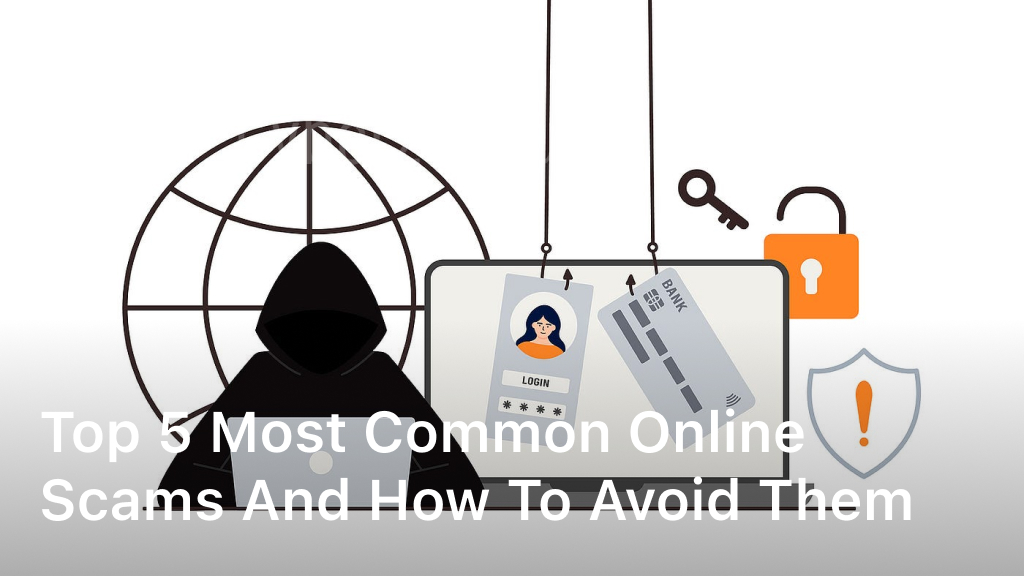Welcome to our comprehensive guide on the top 5 most common online scams that internet users encounter. In today’s digital landscape, where scams and internet fraud are rampant, it’s crucial to stay informed and protect yourself from falling victim to these deceitful tactics. Whether it’s phishing scams, identity theft, romance scams, email scams, ransomware attacks, investment scams, lottery scams, or online shopping scams, we’ve got you covered. Throughout this article, we will discuss each of these scams in detail, providing you with an overview of how they work and the warning signs to watch out for. We will also equip you with effective strategies to safeguard yourself from becoming an easy target for online fraudsters. By understanding the mechanics of these scams and arming yourself with knowledge, you can confidently navigate the online world and protect your personal and financial information. Don’t let scammers take advantage of you; stay one step ahead with our expert advice and tips. Debt Collection Scams Debt collection scams are a common form of online fraud where scammers pose as legitimate debt collectors to extort money from innocent individuals. Understanding how these scams work and learning how to identify them can help protect you from becoming a victim of this type of fraud. How Debt Collection Scams Work Fraudsters typically contact their targets through phone calls, emails, or even text messages, claiming to be debt collectors. They use various techniques to create a sense of urgency and fear, often threatening legal action or consequences if payment is not made immediately. Scammers may provide fake documentation or personal information to convince their victims that the debt is legitimate. They usually demand payment through unconventional methods, such as wire transfers, prepaid cards, or cryptocurrency, making it difficult to trace and recover the funds. In some cases, scammers may even attempt to collect on debts that have already been paid or have expired under the statute of limitations. Signs of Debt Collection Scams Request for immediate payment without providing sufficient details regarding the debt or its origin. Threats of arrest, legal action, or loss of personal assets if payment is not made promptly. Refusal to provide written documentation or proof of the debt upon request. Demand for payment using unconventional methods, such as wire transfers or prepaid cards. Attempts to collect on a debt that you don’t recognize, have already paid, or is past the statute of limitations. Protecting Yourself from Debt Collection Scams Be wary of unsolicited calls, emails, or text messages demanding immediate payment for a debt. Verify the legitimacy of the debt by requesting written documentation and contacting the original creditor directly. Avoid providing personal or financial information to anyone you are unsure of. Do not make payments using unconventional methods requested by the debt collector. Report any suspicious or fraudulent activity to your local law enforcement and the Federal Trade Commission (FTC). Money Transfer or Mobile Payment Services Fraud Online scammers often prey on unsuspecting victims by exploiting money transfer or mobile payment services. These fraudsters employ various tactics to trick individuals into providing their financial information, leading to money transfer scams, mobile payment scams, and online payment fraud. Tactics used by fraudsters: Phishing emails and text messages that appear to be from legitimate money transfer or mobile payment service providers. Fake websites or mobile apps that resemble genuine platforms, designed to steal users’ login credentials and financial details. Social engineering techniques to manipulate victims into disclosing sensitive information or performing unauthorized transactions. Recognizing and avoiding scams: Always verify the legitimacy of the money transfer or mobile payment service provider before sharing personal or financial information. Be cautious of unsolicited communications and avoid clicking on suspicious links or downloading attachments. Double-check the website or app URL to ensure it matches the official website or app of the service provider. Set up two-factor authentication and regularly review your transaction history to detect any unauthorized activity. Only use secure and trusted payment platforms for online transactions. Protecting your financial information: Keep your personal and financial information confidential and avoid sharing it with unknown individuals or websites. Use strong, unique passwords for your money transfer or mobile payment accounts and change them regularly. Regularly update your devices and payment apps with the latest security patches and software updates. Monitor your bank and credit card statements closely for any suspicious transactions. If you suspect a scam or fraudulent activity, report it to the appropriate authorities and the money transfer or mobile payment service provider. By staying vigilant and following these precautions, you can avoid falling victim to money transfer scams, mobile payment scams, and online payment fraud. Protect your financial information and keep scammers at bay. Cryptocurrency Scams With the rise in popularity of cryptocurrency, it’s important to be aware of the potential risks associated with it. Cryptocurrency scams have become increasingly prevalent in recent years, targeting unsuspecting individuals who are drawn to the allure of digital currencies. In this section, we will explore the different types of cryptocurrency scams, highlight some red flags to watch out for, and provide essential precautions to take when dealing with digital currencies. Types of Cryptocurrency Scams: Ponzi Schemes: Scammers promise high returns on investments in cryptocurrencies, while using funds from new investors to pay off earlier investors. Phishing Attacks: Fraudsters send deceptive emails or messages, posing as legitimate cryptocurrency platforms, in an attempt to trick users into revealing their private keys or login credentials. ICO (Initial Coin Offering) Scams: Scammers create fake initial coin offerings, enticing investors to contribute funds to a non-existent or fraudulent project. Fake Exchanges and Wallets: Fraudulent platforms claim to offer secure cryptocurrency exchanges or wallets, only to steal users’ funds or private information. Warning Signs: Unrealistic Promises: Be cautious of any investment opportunity that guarantees unusually high returns or promises quick profits. Unsolicited Offers: Be wary of unsolicited communication offering investment opportunities or promoting new cryptocurrencies. Lack of Regulation: Cryptocurrency scams often operate in unregulated markets, so make sure to research and verify the legitimacy





